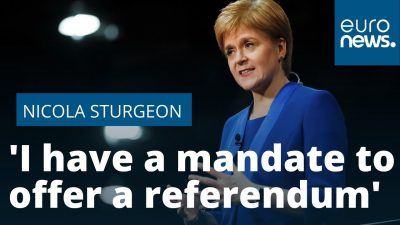Scotland Could Place English in Quarantine as Independence Debate Heats Up

There’s no doubt that Scottish leader Nicola Sturgeon has had a better pandemic than her English counterpart. Sturgeon’s ratings have been consistently high throughout the crisis, with one survey revealing recently that 82% of people think she has handled it well compared with 30% who praised Boris Johnson. Facing the nation every day for the last four months, she has given consistent and clear leadership and advice to her population to see it through this difficult period. Her approach has been careful and measured, not changing the messaging as the Westminster government abruptly did, which caused widespread chaos and confusion. Nor did she hurry to lift the lockdown as was done south of the border several weeks ago. And to her credit, the slogan ‘Stay At Home’ seems to be paying off. The country has now gone 4 consecutive days without a death from coronavirus – a real milestone after months of lockdown. England on the other hand, has not yet got on top of the pandemic, with an increase of 155 deaths recorded on Monday, and the city Leicester forced once again into lockdown.
Sturgeon was cautiously optimistic at her press briefing on Tuesday, declaring ‘I now believe we have a genuine chance to come as close as it is possible to get to eliminating this virus in Scotland’. Professor Devi Sridhar, who advises the Scottish Government on Covid-19, recently outlined the ways in which Scotland has succeeded in overcoming the virus. Firstly, it maintained a longer lockdown than England, with a consistent ‘Stay At Home message; secondly, it implemented local tracing using public health boards instead of relying on an app, as they did down south; and thirdly, it successfully generated trust in the government. The epidemiologist said in an interview with Channel 4 News: ‘There’s a very high level of trust in government and compliance with measures and that’s what I’ve been quite amazed about’.
Sturgeon’s handling of the pandemic is already beginning to influence the independence debate. Given the success story north of the border, it has now been suggested that having an open border with England could pose a threat to Scotland’s ability to control the virus. Restrictions were placed on travel between the two nations in recent months as the pandemic unfolded, in a rare moment of division for a kingdom united since 1707. But the question is now being posed as to whether Scotland should close its border with England in the foreseeable future, or at the very least impose a quarantine on incomers from England. Prof Devi Sridhar recently admitted that the biggest threat to managing the virus in Scotland was new cases arriving from down south. She said: ‘If Scotland was an island – like New Zealand – I would say going for zero cases would be totally feasible’.
Nationalists have naturally got very excited at this prospect. Unionists have conversely got extremely agitated. Sturgeon and Johnson have both weighed in on the debate, with rather heated language expressed by both parties on the issue. The Scottish leader said on Wednesday, that given expert advice, she would not rule out quarantine as an option: ‘I would be failing in my duty not to consider it’. Johnson for his part has turned to flat out denial – stating there ‘is no such thing as a border between England and Scotland’ – a statement Sturgeon has said is ‘absurd’. The Prime Minister brandished the idea of imposing a quarantine for English incomers to Scotland as ‘astonishing and shameful’ and his Scottish Secretary accused Sturgeon of ‘reckless talk’. But the reality is that the two nations have undoubtedly grown further apart since the pandemic took hold.
Recent figures on Scottish Independence reflect this change. A new poll for Panelbase now indicates a majority of 54% support independence – the highest figure to date. The momentum is clearly with the nationalist cause, with the SNP’s Peter Wishart, on Wednesday publishing an outline for a ‘route map’ to independence. He has said that we are at a ‘tipping point’ and if Boris Johnson continues to block further referendums on Scottish Independence, then Scotland will have to appeal to the EU to sanction it. In his plan he said we firstly need to gain a sustained majority in support of independence in the country, followed by securing a second referendum. He says that ‘the scent of decay in the union case is almost overwhelming’ and that ‘If the UK refuses to participate in an agreed referendum in the face of a majority support and a clear democratic mandate, we must presume it has decided to exempt itself from its obligations and responsibilities as a partner in the Union’.
The word ‘partner’ is however, here, misplaced. For Scotland and England have never really been ‘partners’ in the Union. Scotland was dominated by England from the outset, and its culture and language almost obliterated. The very fact that we have to gain ‘permission’ from Westminster to hold a second referendum says it all. Therefore, it is true, that in order to secure independence, Scotland’s only hope is to appeal to bodies outwith the UK, such as the EU for help in achieving autonomy. Otherwise, at this rate, we’ll still be debating this by the time the next pandemic arrives. What a thought that is…
*
Note to readers: please click the share buttons above or below. Forward this article to your email lists. Crosspost on your blog site, internet forums. etc.
This article was originally published on InfoBrics.
Johanna Ross is a journalist based in Edinburgh, Scotland.
Featured image is from InfoBrics

